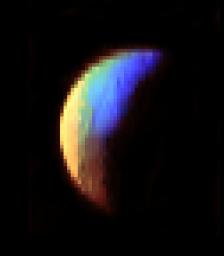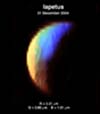
|
VIMS Shows Iapetus Surface Composition
- Click the image above for a larger view
- Full-Res JPEG (504 x 576) (12.8 kB)
- Full-Res TIFF (504 x 576) (286.6 kB)
Caption:
This color composite image of Saturn's moon Iapetus from Cassini's visual and infrared mapping spectrometer was obtained on Dec. 31, 2004, an hour and a half before the New Year, at a distance of 121,000 kilometers (75,186 miles), with a spatial resolution of about 60 kilometers (37 miles).
The three colors used in the mosaic correspond to 1.01, 3.21, and 3.80 microns. The different colors represent vastly different surface compositions. The upper bright blue region is rich in water ice, while the lower, dark brown region is composed mainly of a substance rich in organic material. The yellow region consists of a mixture of ice and organics, suggesting a gradual change in composition on the surface. This pattern suggests Iapetus swept up the dark material, which may have come from debris created from meteoritic impacts onto the small, outer satellites of Saturn.
Background Info:
The Cassini-Huygens mission is a cooperative project of NASA, the European Space Agency and the Italian Space Agency. The Jet Propulsion Laboratory, a division of the California Institute of Technology in Pasadena, manages the mission for NASA's Science Mission Directorate, Washington, D.C. The Cassini orbiter and its two onboard cameras were designed, developed and assembled at JPL. The visible and infrared mapping spectrometer team is based at the University of Arizona, Tucson.
For more information about the Cassini-Huygens mission visit, http://saturn.jpl.nasa.gov . For more information about the visual and infrared mapping spectrometer visit http://wwwvims.lpl.arizona.edu/ .
Cataloging Keywords:
| Name | Value | Additional Values |
|---|---|---|
| Target | Iapetus | Saturn |
| System | Saturn | |
| Target Type | Satellite | Planet |
| Mission | Cassini-Huygens | |
| Instrument Host | Cassini Orbiter | |
| Host Type | Orbiter | |
| Instrument | Visual and Infrared Mapping Spectrometer (VIMS) | |
| Detector | ||
| Extra Keywords | Color, Impact, Infrared, Visual, Water | |
| Acquisition Date | ||
| Release Date | 2005-01-10 | |
| Date in Caption | 2004-12-31 | |
| Image Credit | NASA/JPL/University of Arizona | |
| Source | photojournal.jpl.nasa.gov/catalog/PIA07002 | |
| Identifier | PIA07002 | |

